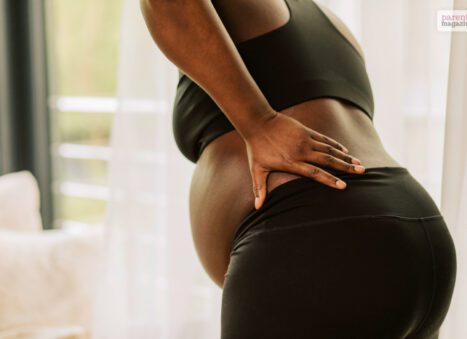
Still No Period After Pregnancy, When to Worry, Or Is It Normal?
Have you recently had a baby and still haven’t gotten your period back? Don’t worry, it’s normal for it to take a while for your menstrual cycle to return after pregnancy. But at what point should you start to get concerned? As a new mom, the last thing you need is another thing to stress about. However, not having a period for an extended time could indicate an underlying issue with your reproductive health that needs to be addressed. In this article, we will talk in detail about no period after pregnancy and when to worry! Read on.
Understanding Postpartum Amenorrhea: Why You Haven’t Gotten Your Period Back
It can take 4 to 6 weeks for your period to return after giving birth, but for some women, it takes longer. This is known as postpartum amenorrhea, and it’s usually nothing to worry about.
Your body has been through a lot, and getting back to its normal cycle is no small feat. Between recovery, breastfeeding, and lack of sleep, your hormones are still stabilizing. This process can delay the return of your menstrual cycle for months.
While frustrating, postpartum amenorrhea lasting up to 6 months is typically considered normal and not a cause for concern. However, if:
- It’s been over 6-9 months, and your period hasn’t returned.
- You’re not breastfeeding, and it’s been over 3 months.
- You have symptoms like abnormal bleeding, pain, or discharge,
You should consult your doctor. They can check for any underlying issues and may prescribe medication like birth control pills to help jumpstart your menstrual cycle.
The return of your period can be an emotional experience, but remember your body is still recovering in its own time. Be patient and focus on taking care of yourself. Your cycle will regulate again, even if it’s not quite back to “normal” just yet.
Common Causes of No Period after Pregnancy?
The most common cause of no period after pregnancy is postpartum hormonal changes, especially for breastfeeding moms. However, prolonged lack of menstruation (over 6-9 months) could signify an underlying hormonal issue or uterine problem requiring medical attention. We have mentioned some possible causes for no period several months after pregnancy, including:
Breastfeeding:
If you’re exclusively breastfeeding, your period may take longer to return as breastfeeding causes the release of prolactin, which suppresses ovulation. For some women, menstruation does not resume until breastfeeding is stopped or supplemented.
Hormonal imbalance
Pregnancy and breastfeeding cause fluctuations in estrogen and progesterone. It can take time for these hormones to regulate after childbirth, delaying your period.
Uterine infection
If there is an infection of the uterus or reproductive organs, such as Pelvic Inflammatory diseases (PID) or Chlamydia, then it may delay your menstruation cycle after pregnancy. You may need to consult a doctor and take antibiotics to clear up the infection before your cycle can resume.
Asherman Syndrom
This is a medical condition that is caused when scar tissue develops on the uterus or cervix. This happens after a uterine fibroid surgery, elective abortion, retained placenta after giving birth, and missed or incomplete miscarriage.
Women who have Asherman syndrome will not experience blood flow that happens during menstruation, but they will experience the pain. This is because menstrual pain is caused due to prostaglandins, a type of chemical present in our uterus responsible for the contraction of uterine muscles.
Birth Control Pill
If you have gone back to using birth control pills after your pregnancy, then that can also be the reason for a missed period or delay in menstruation. This is because birth control pills generally contain a type of progesterone that helps in stopping ovulation and delaying menstruation.
Other causes
Conditions like polycystic ovary syndrome, excessive weight loss, stress, excessive exercise, and some medications may contribute to a lack of menstruation. Thyroid disorders or pituitary gland issues are less common but more serious causes that also require diagnosis and treatment.
If your period has not returned within 3 months after giving birth, it’s a good idea to consult your doctor. While most women will resume menstruation between 6 weeks to 3 months postpartum, some cases require medical evaluation and treatment.
When to Start Worrying About No Period After Pregnancy
If Aunt Flo is MIA even after 6-8 weeks postpartum, it’s time to take action. As we have explained in the section above, not having a period after pregnancy can often be normal, but the prolonged absence of menstruation can sometimes signal an underlying issue.
First, rule out pregnancy. Take a home pregnancy test just to be sure. If negative and you’re exclusively breastfeeding, your period may take longer to return since breastfeeding suppresses ovulation. However, after six months, most breastfeeding women will menstruate again.
If you’ve stopped breastfeeding or weren’t breastfeeding at all, see your doctor. They can check for any hormonal imbalances or other issues preventing your cycle from restarting. Conditions like hypothyroidism or hyperprolactinemia can cause absent periods.
If your period does not return within 12 weeks postpartum or you experience symptoms like abdominal pain, heavy bleeding, or difficulty breastfeeding, consult your doctor right away. They can check for any underlying issues and determine appropriate treatment to help regulate your menstrual cycle and hormone levels after pregnancy.
Will Your Postpartum Period Be Any Different When It Comes Back? Yes, It Might!
After you have given birth, your period will change a little. However, the chances are pretty low, or it might not change at all. There is a chance for your periods to become longer or shorter, or you may have a lighter or heavier flow. The length of the overall cycle might change, too.
There is also a good chance that you might experience some change in how the stomach cramps show up during postpartum periods.
This mainly happens because the uterus becomes slightly bigger when you become pregnant.
Some of the most common changes that you may experience once your periods come back after delivery are:
- Smaller blood clots
- Cramping gets lighter or stronger than usual
- A heavier flow
- A flow that keeps stopping and starting
- Increased pain
- Irregular lengths of the cycle
The very first period that you get after delivery may be way heavier than what it used to be. It may also come along with intensive cramping because the uterine lining sheds after childbirth. As you further move further down the cycle, these changes will slowly fade away.
In some rare cases, complications like adenomyosis and thyroid problems may lead to intense bleeding after pregnancy. Adenomyosis is a condition that causes the uterine wall to become thick.
Women who suffer from endometriosis before getting pregnant might experience very light bleeding after childbirth. Light periods might also happen due to some rare conditions like Sheehan syndrome and Asherman syndrome. The Asherman syndrome results in scarring tissues in the uterus. The Sheehan Syndrome, on the other hand, happens when the pituitary gland gets damaged, leading to severe blood loss.
When To Speak To The Doctor?
If your periods still don’t come back after a few months of your pregnancy, you may be thinking about having a talk with your doctor. In that case, you can easily go and have a conversation with your doctor whenever you want. They will answer every question you have, and you will get all the reassurance you need. This is any day better than assuming things and proceeding likewise.
It is also feasible if you have a conversation with your doctor if you experience any of the following:
- A heavy blood loss than what you would experience previously.
- Any other change in your period pattern, which also includes lack of bleeding.
- Blood clots in your periods.
Just remember that you are not the only one who is facing the problem. There are thousands of women who experience the same thing and have very similar concerns regarding their periods not coming back after pregnancy.
In such a situation, it is extremely important that you know about what is normal and what is not. If you wish to, you can go ahead and discuss it with anyone that you trust. They may be able to give you a piece of better advice on what you need to do. While a doctor’s opinion is of utmost importance, it is only feasible that you pay them a visit only when it is absolutely necessary to do it.
Bottom Line
While it’s normal for your period to take some time to return after pregnancy, if it’s been several months and there’s still no sign of it, talk to your doctor. They can run some tests to determine if there are any issues with your hormone levels or if something else may be going on.
Don’t just brush it off – your reproductive health is important, and the sooner you address any problems, the better. Remember that every woman’s body is different, so don’t compare yourself to friends or family members.
Focus on what’s normal for you, and if something feels off, let your doctor know right away. They’re there to help put your mind at ease and get your cycle back on track. You’ve been through a lot over the past nine months, so make sure to continue giving your body the rest and care it needs. Before you know it, you’ll be back to your usual routine and wondering how the time flew by so fast!
RECOMMENDED READING:
Already have an account?
Sign In
Create your account
User added successfully. Log in









